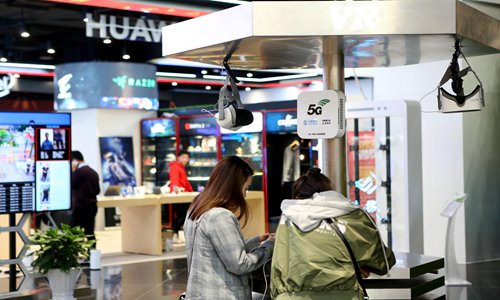
Visitors are seen in an intelligent experience center in Shanghai on March 10. It's the first 5G smart experience center in China. It was formerly an outlet of China Mobile. Visitors can experience 5G technology such as smart home appliances, e-sports and holographic videos at the center, where it only takes one second to download a super high-quality movie via the 5G network. (Photo: VCG)
Unlike the US which politicizes China's high-tech rise, Europe is believed to adopt a more rational, fact-based approach on 5G development and the involvement of Chinese firms, and a more open business environment in the continent will also help accelerate the implementation of the next generation of wireless technology.
EU leaders will coordinate their positions Thursday evening (Brussels time) on issues they intend to raise with China at a summit scheduled on April 9, such as tight cooperation on WTO reform and cybersecurity concerns, Reuters reported Thursday, citing an unnamed senior official.
"We are ready to offer China very comprehensive cooperation in many areas," the official was quoted as saying in the report.
The EU set 10 concrete actions on March 12 to counter China's growing economic power and political influence, within which it called for a safeguard against potential serious security implications for critical digital infrastructure.
5G, the next generation of wireless technology that will revolutionize industries, has become a major focus in discussions among European policymakers and industry representatives, particularly when it comes to the role of Chinese companies such as Huawei Technologies and ZTE Corp, which are also major telecom equipment suppliers in the region.
Germany kicked off an auction of the spectrum for 5G networks Tuesday, a step forward in meeting its target of offering 5G services by 2020.
While Washington has been lobbying Europe, urging its major allies to bar Huawei from helping build 5G networks, some European nations have not yielded to US pressure by insisting on unified standards and fair competition.
German Chancellor Angela Merkel said on Tuesday her government's approach is not to simply exclude one company or one actor in developing 5G, according to media reports.
The Federal Network Agency of Germany, known as the Bundesnetzagentur, told the Global Times that "security requirements apply to all network operators and service providers, irrespective of the technology they deploy."
"A more open, fact-based approach will help Europe accelerate 5G development, and I believe Europe, unlike the US, will separate politics from technology," Fang Xingdong, founder of Beijing-based technology think tank ChinaLabs, told the Global Times on Thursday.
Different stance
Countries like Monaco, Italy and Switzerland are moving faster in 5G development, thanks to their cooperation with Huawei and ZTE.
For instance, local carrier Monaco Telecom and Huawei signed an agreement in February to accelerate deployment of a smart city program in the country, which is also in line with the 5G Smart Nation project adopted by Monaco.
In Switzerland, telecoms provider Sunrise is rolling out a Huawei-powered 5G network covering more than 150 towns, cities and villages.
"How far European countries could resist US influence will also determine how fast they will move in catching up in 5G deployment," Fang said.
Huawei is estimated to have a market share of 35 percent in Europe, and it's the largest telecom infrastructure supplier worldwide ahead of Nokia, Ericsson and ZTE, according to media reports.
"They [Huawei] are certainly a leader and are competitive with the likes of Ericsson and Samsung Networks. They have an impressive end-to-end solution from device to infrastructure likely only rivaled by Samsung," Will Townsend, senior analyst at US-based Moor Insight & Strategy, told the Global Times on Thursday.
Industry analysts also predicted that banning Huawei will create a vacuum that no one can fill in a short time, which might seriously impair 5G deployments worldwide.
"Technically, it is possible to find other workarounds [for] Huawei's technology, but it would be a huge waste of investment and not beneficial for the whole ecosystem, including telecom players, software and hardware partners, and eventually enterprise customers and consumers," Charlie Dai, principal analyst of US market research firm Forrester, previously told the Global Times.


